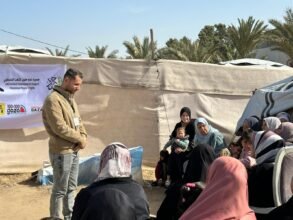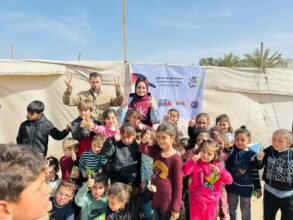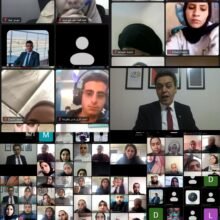
ICSPR Calls for Urgent and Comprehensive Humanitarian Response for Genocide Survivors in Gaza in Line with International Standards and the Sphere Handbook
Date: May 25, 2025
Press Release
ICSPR Calls for Urgent and Comprehensive Humanitarian Response for Genocide Survivors in Gaza in Line with International Standards and the Sphere Handbook
The International Commission to Support Palestinian Rights (ICSPR) has issued a legal position paper titled: “The Required Humanitarian Response for Genocide Survivors in Gaza – In Light of International Standards and the Sphere Handbook,” prepared by lawyer and human rights researcher Rana Majed Hdeib. The paper addresses the catastrophic humanitarian conditions experienced by survivors of the ongoing genocide in the Gaza Strip amid the continued Israeli military aggression since October 7, 2023, the complete collapse of humanitarian and service systems, and the disgraceful international silence toward the crimes being committed.
In its paper, the Commission stated that the current international response does not meet the scale of the humanitarian catastrophe and the crimes being committed. It called for a comprehensive response based on fundamental humanitarian principles and grounded in recognized international standards, particularly the Sphere Handbook and Minimum Standards for Humanitarian Response in Disaster Situations.
Violations in Gaza Amount to Genocide
The paper confirms that since the onset of its wide-scale aggression on Gaza, the Israeli occupation has committed systematic crimes that fulfill the legal criteria for the crime of genocide as defined in the 1948 Convention on the Prevention and Punishment of the Crime of Genocide—particularly considering the large-scale targeting of civilians and civilian objects, systematic destruction of infrastructure, obstruction of aid entry, and deliberate starvation of the population.
According to data presented in the paper, as of mid-May 2025, the aggression has resulted in:
-
The killing of over 70,000 Palestinians, the majority of whom are women and children.
-
Injuring over 123,000 others, many with permanent disabilities.
-
Destruction of over 88% of residential buildings, as well as health, educational, and service institutions.
-
Forced internal displacement of more than 1.9 million people, living in inhumane conditions without shelter or basic services.
-
The death of hundreds due to hunger, medicine shortages, and disease outbreaks, particularly in the north, which has faced systematic siege and starvation.
Clear Deficiencies in the International Humanitarian Response
The paper highlights the failure of the international humanitarian system to provide a prompt and effective response to the ongoing disaster in Gaza. Efforts have lacked coordination, transparency, and efficiency, and have been affected by political pressures, especially with the continued discrimination in aid distribution and the prevention of relief material entry through border crossings.
It also notes the inaction of UN agencies in providing shelter, food, and physical and psychological healthcare to victims, while survivors continue to suffer from severe psychological and social trauma requiring a multi-dimensional response, including:
-
Mental health and psychosocial support.
-
Provision of safe shelter, clean water, and sanitation services.
-
Access to sufficient and nutritious food without discrimination or coercion.
-
Access to both basic and specialized healthcare services.
Sphere Handbook as a Binding Reference
The paper stresses the importance of adopting the Sphere Handbook as a binding reference framework for humanitarian response, as it defines minimum standards for ensuring dignity and protection of survivors through four main pillars:
-
The right to human dignity.
-
The right to assistance.
-
The right to protection and safety.
-
The right to participate in decision-making.
The paper warns that failure to apply these standards in Gaza places the international community in a position of complicity or gross negligence, calling for immediate course correction and an end to the politicization of humanitarian aid.
Urgent Recommendations for the International Community and Humanitarian Organizations
The legal position paper concludes with strategic and practical recommendations, including the following demands:
-
Recognition by the international community that what is happening in Gaza constitutes genocide, and accountability for perpetrators before international justice.
-
Provision of an urgent and comprehensive humanitarian response, going beyond temporary relief to include reconstruction and long-term psychosocial support.
-
Immediate lifting of the blockade, and ensuring permanent and regular opening of crossings, allowing unrestricted aid entry.
-
Inclusion of local civil society organizations and human rights bodies in relief mechanisms and aid distribution, and in monitoring their performance.
-
Strengthening international oversight mechanisms to prevent manipulation, corruption, or political exploitation of aid.
In conclusion, ICSPR calls on the United Nations, Human Rights Council, International Criminal Court, international relief organizations, and States Parties to the Geneva Conventions to act immediately to end this escalating tragedy, halt gross violations, and end the policy of impunity.
It stressed that the human dignity of victims is non-negotiable, and that international silence has emboldened perpetrators to continue their crimes, urging the restoration of humanitarian justice and activation of international legal tools to protect civilians in Gaza.





